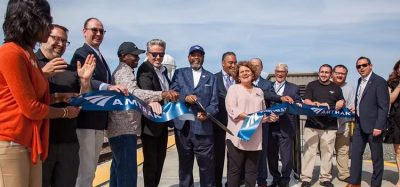Northern’s £250k Accessibility Innovation Fund green lights six projects
Posted: 3 May 2023 | Elliot Robinson (Editorial Assistant - Global Railway Review) | No comments yet
Six projects designed to improve passenger accessibility have been given approval due to Northern’s £250,000 Accessibility Innovation Fund.


Credit: Northern
Northern has announced details of six game-changing projects given the green light thanks to its £250,000 Accessibility Innovation Fund. Projects include using AI to interpret customer announcements into British Sign Language, a scheme to encourage older people to have days out on the train and a hub to rent out wheelchairs and mobility scooters.
The fund is designed to empower communities to make decisions which will improve the railway for all and is now in its second year. The successful bids were chosen by the independent Northern Accessibility User Group (NAUG) and supported by Northern.
NAUG is a pan disability user group whose membership represents a very wide range of disabilities on a personal basis and from the perspective of disability groups and organisations reflecting the communities served by Northern.
“Our customers are the heart of everything we do, and we are dedicated to making Northern’s services accessible to everyone, and to having a positive impact for the north,” Mark Powles, Commercial and Customer Director, at Northern said. “I am happy to announce that six bids have been successful, and I would like to thank everyone who got in touch with us with their ideas. The fund is part of our wider project to transform our network and encourage people to use public transport – no matter their circumstances.”
“The fund has again produced a wide range of ideas aimed at improving accessibility of rail travel across the Northerns network and our user group panel was faced with a very tough job to decide the winners,” Mark Wilson, Chair of NAUG, said. “What has been so impressive is the enthusiasm and commitment around schemes that help encourage older and disabled people to try the train for the first time, or to return to rail travel. When added to an inspiring focus on supporting those with less visible and sensory disabilities, we have a cracking set of awards that will continue to build passenger confidence.”
Related content you will enjoy:
New Passenger Assist Points to be installed at Northern stations
Customers to see new and improved information screens across Northern network
Q&A with Marc Silverwood, Northern: Development of intelligent trains
The full list of successful bids are:
South Yorkshire Mayoral Combined Authority
SYMCA will create an Accessibility Hub at the Meadowhall Transport interchange. Together with TransPennine Express, they will provide loaned mobility scooters and wheelchairs to encourage older and disabled customers to use rail travel to get to Meadowhall. The scheme will offer a seamless experience and make it easier for customers to get around the shopping centre.
The Signapse project
A trial to offer BSL interpretation of customer information announcements using AI technology at Manchester Victoria station. Judges praised the trial’s location and its potential to improve communication for the deaf community. They also noted the project’s innovative and interesting approach.
The Cumbrian Coast Line Community Rail Partnership
The partnership will create user-friendly display panels and accompanying leaflets to promote active and accessible travel along the Cumbrian Coast Line. Judges praised the combination of new technology and traditional leaflets, which would benefit older and disabled people who may struggle with digital signage.
Community Rail Lancashire’s Adventures for All project
A programme of engagement for autistic passengers that will include interactive and accessible activities designed to encourage rail confidence and connect with people and places along the Autism Friendly Line. Judges praised the bid’s well-researched approach, self-led engagement, and value for money.
Community Rail Cumbria’s Soulful Days Out
The initiative will focus on engaging older communities such as Age UK to take days out on the train. Judges praised the outreach and engagement efforts and the initiative’s potential to encourage people who wouldn’t normally travel independently to use trains.
Chrome Angel Solutions’ Accessible Travel VR Simulation
The project aims to expand on the existing VR simulation game and use it for staff training purposes. The project will develop new staff characters, enabling staff to practice providing good assistance to customers who need it. Judges praised the potential of the project to help staff improve their customer service skills when handling challenging situations.
Related topics
Artificial Intelligence (AI), Funding & Finance, Passenger Experience/Satisfaction, Regulation & Legislation







